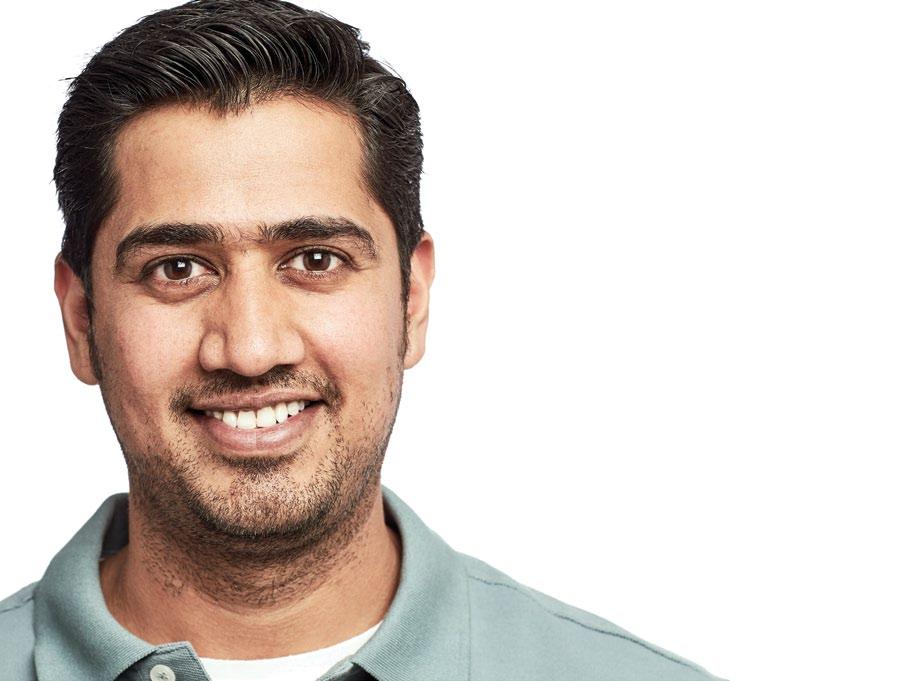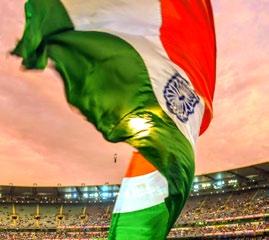
3 minute read
image of religious tolerance is #myIndianlink
from 2022-08 Sydney
by Indian Link
check out the photo gallery from Indian Link’s second annual independence Day Photo Contest
The two images made it to the top of a shortlist of 16, culled from 106 entries this year. The Indian flag, fondly called Tiranga (Tricolour), featured prominently this time round, taking off no doubt from the Indian Government’s #HarGharTiranga initiative. It turned up at a variety of places in our contest – at the MCG; in the sky as a boxed kite; in the freezing water at a Sydney beach; on the wheelchair of a physically challenged athlete.

Colour and celebration were other recurring themes - judges scrolled through many Holi snapshots.
Religion and spirituality were also high on our photographers’ minds, perhaps after two years of a worldwide health crisis and changed living conditions. Night lights at the Golden Temple, prayers at the mosque, the famed Ganga aarti at dusk, and Jain temple architecture also made the cut.
Snapshots of kids were plentiful too, the high energy and unbridled joy in them making pleasant works of art.

The
Gambling too often, spending more than you can afford, or missing time with friends and family?
If you think gambling may be a problem for you or a loved one, call GambleAware and receive free, confidential support 24/7. Visit gambleaware.nsw.gov.au/indian
•
•
* Extensive research based and traditional evidence for homeopathy supporting the above health concerns for men, women, and children.

Breast cancer patients voicing their perspectives on treatment is significant to their prognosis and recovery
Anew study on breast cancer has found that a patient’s perspectives on their wellbeing can be better at predicting treatment and symptoms than clinicianbased tools.
Natansh Modi, lead author of the study conducted at Flinders University’s Clinical Cancer Epidemiology Lab, says the research findings highlight the importance of patient self-reports on their physical, social, emotional and functional abilities, in their treatment journey.

When the patient shares their opinion on their symptoms, it is formally known as the ‘Patient-reported outcomes (PROs)’. These are usually treated as “secondary data to help with interpreting results”, according to Modi, but the new research results have shown these to be “significant factors associated with either the patient’s overall survival of cancer, with cancer not progressing, or severe adverse events during treatment.”
Almost 3000 breast cancer patients were studied as part of the research.
Additionally, the study found that patientreported data was often at odds with clinician-based data, with some clinicians overestimating their patient’s physical wellbeing. “We determined that around 70% of the patients who their clinicians defined as ‘fully active, and able to carry on all pre-disease performance without restrictions’, went on to report limitations in their physical wellbeing status when asked,” Modi said.
These findings have spotlighted that a non-medical part of treatment –communication, can change the treatment journey for many patients. More weightage must be given to patient’s self-assessments as part of their treatment process.
A combination of questionnaires for patients and the clinician’s medical knowledge is the key to having a shared decision-making process in treatment.
Natansh Modi told Indian Link why these conversations were so important to him.
“To ensure that the most appropriate and informed decision is made for the patient, the clinician and patient must collate and discuss the available evidence on the benefits and harms of treatments.”
He added that as a pharmacist, when patients ask him how certain drugs will work for them, he would rather give them a ‘personalised prediction’ of how it would impact them specifically than offering up generic advice.
“It’s not just about the clinician telling you how well the drug works, it’s also about listening to the patient as well because oftentimes they have a good enough indication of how they feel in their body,” he expressed.
So, what’s going wrong in these conversations?
“One of the barriers is perhaps patients think that their perspective is dumb or stupid, or they think that the clinician is already thinking about it, so they don’t see that it’s important to mention it [their understanding of their symptoms,”] Modi replied. “Breast cancer drugs are very hard on your body with a lot of side effects, and if a patient says they’re not feeling well, perhaps the dose they’re getting is too high.”
According to Modi this isn’t a new occurrence. Previous research has also shown that in other forms of breast cancer, the patients’ recount of their wellbeing is also consistently different to the clinician’s report.
For him, this research is a starting point. The ultimate aim is to see the implementation of patient surveys in cancer treatment to allow them to express their perspective clearly to clinicians – an essential component in patient-centred care.
Iqra Saeed










